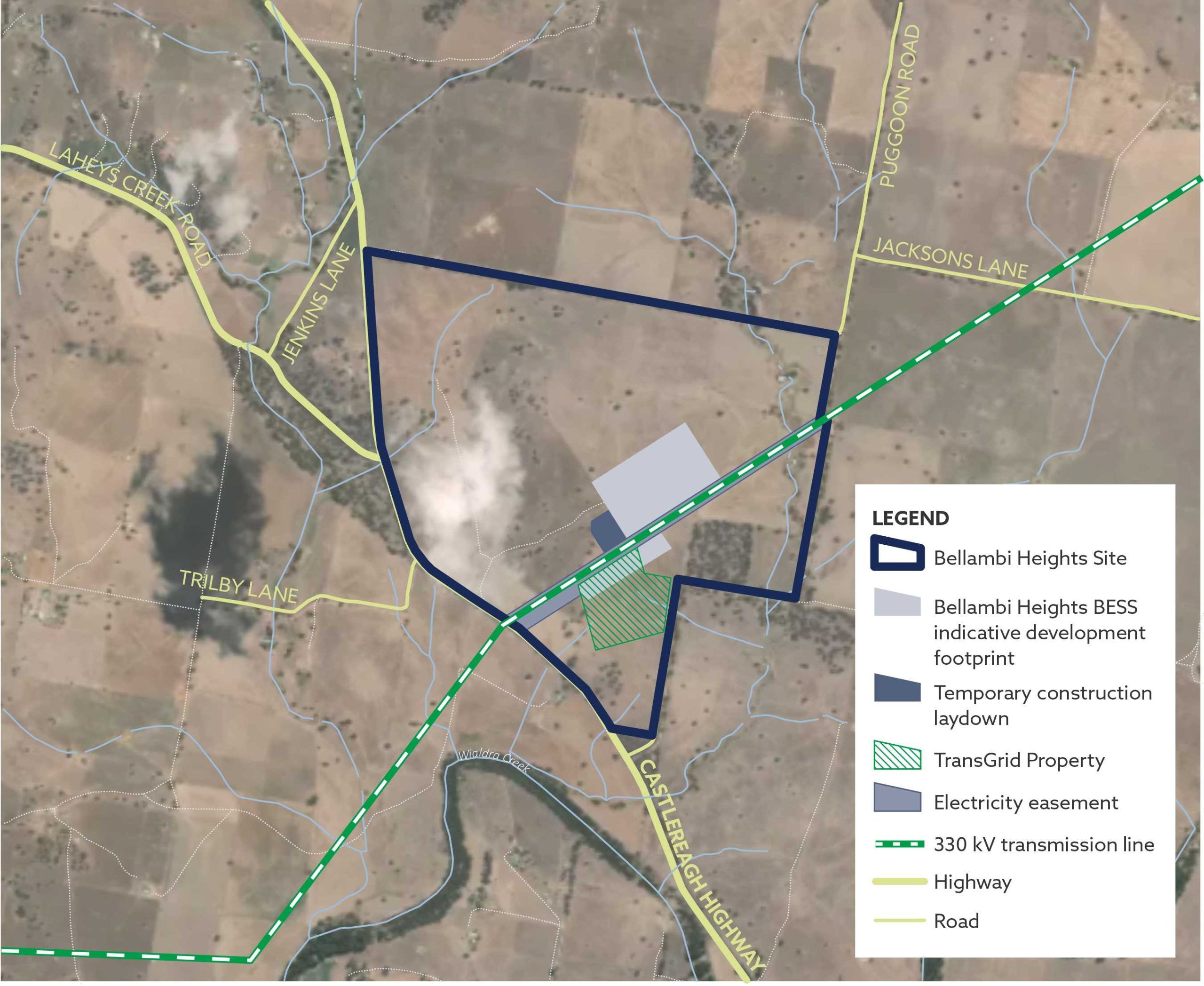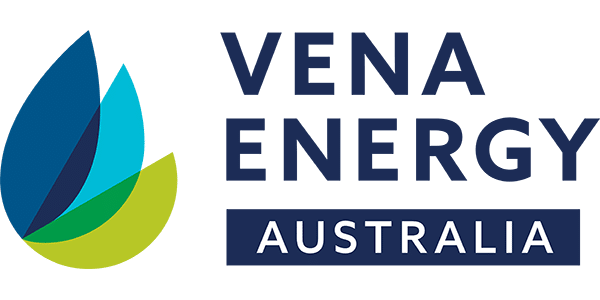Bellambi Heights BESS
| Project Name | Bellambi Heights BESS |
| Technology | Battery Energy Storage System |
| Capacity | 408 MW |
| Project Size | 23 ha |
| Location | Beryl, New South Wales |
| Targeted Construction Date | Q1 2025 |
PROJECT OVERVIEW
The Bellambi Heights Battery Energy Storage System is a 408 MW battery capable of providing up to 2 hours of storage and will be supported by associated infrastructure. The BESS is expected to be built in 2 stages at up to 204 MW per stage or up to 408 MW in one stage.

The Project is located approximately 6.5 kilometres north-west of Gulgong within the Mid-Western Regional Council area and the Central-West Orana Renewable Energy Zone. The site location within the Central West Region is ideally placed to contribute to the development of the Central-West Orana Renewable Energy Zone and assist in meeting NSW’s energy generation and storage requirements. The Project site presents optimal conditions for utility-scale BESS as it is relatively flat, undulating and predominantly cleared, with existing 330 kilovolt transmission lines traversing the site.
The Project site provides a strong point of connection to the transmission network, making it an ideal site for providing storage and firming capacity to the NSW electricity grid with minimal requirements for additional transmission infrastructure.
There is a need for storage within the network as security and reliability become increasingly important aspects in the transition to renewable energy generation. The intermittent nature of wind and solar resources creates the need for ‘back-up’ capacity to support any supply gaps. The Australian Energy Market Operator has identified that storage capacity needs to triple within the National Energy Market to meet electricity needs, while the New South Wales Electricity Roadmap forecasts an additional 2.3 GW of energy storage is needed to maintain system security and reliability.
Project History
The Project has been in early development since 2018 and in 2019 a preliminary concept for the project was presented to the local community and stakeholders as the ‘Gulgong Solar Farm’, consisting of three stages with up to 500 MW of solar and 600 MW of BESS with six hours of storage capacity. Early community feedback led to several key changes to the Project, ultimately reducing the development footprint by more than 50%, providing native vegetation screening, and relocating key elements of the compound.
In early 2022, the Project’s Scoping Report was submitted to the New South Wales Department of Planning and Environment for a 200 MW solar farm, 200 MW BESS and a switchyard connecting the Project to the existing 330 kilovolt Wellington to Wollar transmission line. Refinements in the project footprint resulted in removal of the solar component entirely and development of only the BESS and switchyard components of the Project.
Upon receipt of the Secretary’s Environmental Assessment Requirements, a number of technical assessments and stakeholder engagement efforts have been undertaken to inform the Project Environmental Impact Statement and further refine the development footprint. Vena Energy has consulted with several key stakeholders, including the local community to identify the optimal project configuration.
In 2019, a preliminary concept for the project was presented to the local community and stakeholders as the ‘Gulgong Solar Farm’, consisting of three stages, across non-contiguous properties with up to 500 MW of solar and 600 MW of BESS with six hours of storage capacity. Following the consideration of early community feedback several key changes were made to the Project, ultimately reducing the development footprint by more than 50%, providing native vegetation screening, and relocating key elements of the compound.
In 2022, the Project’s Scoping Report was submitted to the New South Wales Department of Planning and Environment for a 200 MW solar farm, 200 MW BESS and a switchyard connecting the Project to the existing 330 kilovolt Wellington to Wollar transmission line.
In 2023, following the consideration of recent site investigations, which identified a potential buildable footprint that would result in a solar farm with a generation capacity significantly less than proposed in March 2022, Vena Energy has decided to only commit to the development of the BESS and switchyard components of the Project.
Planning Process
The Project is a State Significant Development (SSD) and an Environmental Impact Statement (EIS) is required to be assessed under the Environmental Planning and Assessment Act (1979). The Department of Planning and Environment has accepted Vena Energy’s response to the feedback raised in submissions for the Project. You can access this Submissions Report on the Major Projects Website. The Department will now commence its assessment having regard to the issues raised in the submissions and Vena Energy’s response.

The Department of Planning and Environment have developed a suite of guidelines for State Significant Development projects to detail the assessment process and expectations for the environmental assessment documentation.
All current State Significant Applications can be found on the Department’s Major Project Portal, which provides a platform to gain insights into the status of the assessment process, access all relevant assessment materials for the Development Applications, and contact details for the Department’s assessment officer.
Engagement
Vena Energy has completed a Submissions Report in response to submissions made during the Project’s Public Exhibition period. This is currently being assessed by the Department, being the fifth stage of the Environmental Impact Assessment.
Community participation is essential, leading to improved project design, reduced environmental impacts and ecologically sustainable development.
Throughout the State Significant Development assessment process, Vena Energy has utilised a range of communication tools to engage with stakeholders including a dedicated project website, dedicated project email address and phone number, communication information sessions and newsletters, post, emails, phone calls and advertising in local newspapers.
During preparation of the Environmental Impact Statement, several engagement activities have been completed, including:
- Community Information Sessions, which were hosted in November 2022 and February 2023, providing the local community and affected stakeholders an opportunity to ‘drop-in’ and share feedback, meet the project team, gain an understanding of the changes made to the development scope since 2019.
- Drawing from experience from the November 2022 information session, the approach to the February 2023 round of engagement was tailored to better suit the community to increase attendance and engagement from community stakeholders.
- Engagement with key stakeholder groups, including adjoining landholders, traditional owners, Council and State Government Agencies.
- Project update newsletters and invitations to a range of consultation opportunities was provided to the attendees of the Community Information Session, and further distributed to surrounding landholders, and residents of Beryl and Gulgong via letterbox drops.
- Public Exhibition Period of the Environmental Impact Statement, which concluded in October 2023.
- Response to submissions following Public Exhibition Period.
The purpose of Vena Energy’s engagement process is to:
- Undertake clear and meaningful engagement that is proportionate and tailored to the needs of stakeholders.
- Facilitate engagement opportunities with stakeholders at all stages of the assessment process and in accordance with the State Significant Development guidelines.
- Acknowledge, address, and consider stakeholder feedback so that Vena Energy may consider alternate Project approaches.
Vena Energy will continue to engage with key stakeholders and the community throughout the EIS assessment process, through to determination of the Project. If the Project is approved, ongoing community engagement will continue in line with the State Significant Development Engagement Guidelines and Conditions of Approval.
Benefits
As an emerging leader in sustainable energy development in Australia, Vena Energy understands that our long-term success goes hand-in-hand with enhancing the broader well-being of the communities and regions in which we operate. Vena Energy looks forward to making a positive contribution to the local community, the region’s economy, and the nation’s transition to renewable energy.
The Project provides an opportunity to increase the energy storage capacity within New South Wales, which is aligned with the Australian Energy Market Operator’s recommendation that the installed storage capacity will need to triple to meet electricity needs. The BESS will provide both storage as well as firming capacity to the NEM and will assist with grid stability by providing frequency control ancillary services.
Vena Energy supports a local procurement policy and will promote participation from local, regional, and Australian suppliers wherever possible. Local purchasing is likely to include a wide range of products and services from fencing contractors, concreters, welders, electricians, plant and equipment operators, transport contractors, and administrators.
Employment & Procurement
Project Documentation
Letter to Department of Planning and Environment - Project Update and Refinement
News
News and mentions relevant to the Bellambi Heights BESS will be posted here, such as news articles or future stakeholder events or activities.
Feedback
Vena Energy Australia is committed to delivering world class renewable energy projects that better serve the interests of our communities and stakeholders.
Further to this commitment, we take pride in keeping an open ear, so we invite you to get in touch if you have any feedback or require additional Project information, please contact us via the platforms below.
Bellambi Heights Project Team
Phone: 1800 841 229
Email: bhrp.mailbox@venaenergy.com
Feedback Form: here or via the QR code


